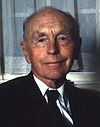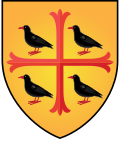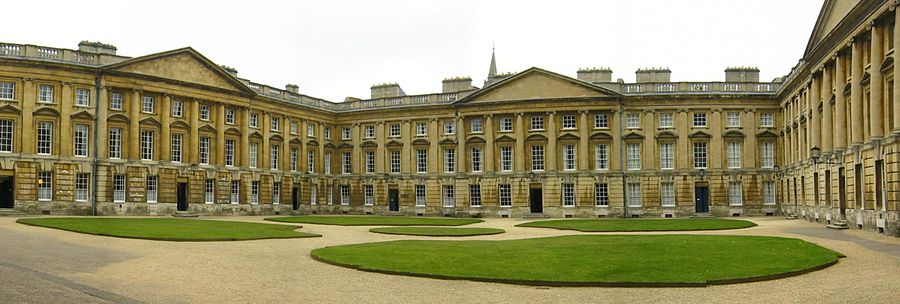Portal:University of Oxford
| Main page | Indices | Projects |
The University of Oxford portal
The University of Oxford is a collegiate research university in Oxford, England. There is evidence of teaching as early as 1096, making it the oldest university in the English-speaking world and the world's second-oldest university in continuous operation. It grew rapidly from 1167, when Henry II banned English students from attending the University of Paris. After disputes between students and Oxford townsfolk in 1209, some academics fled north-east to Cambridge where they established what became the University of Cambridge. The two English ancient universities share many common features and are jointly referred to as Oxbridge.
The University of Oxford is made up of thirty-nine semi-autonomous constituent colleges, four permanent private halls, and a range of academic departments which are organised into four divisions. Each college is a self-governing institution within the university, controlling its own membership and having its own internal structure and activities. All students are members of a college.
It does not have a main campus, but its buildings and facilities are scattered throughout the city centre. Undergraduate teaching at Oxford consists of lectures, small-group tutorials at the colleges and halls, seminars, laboratory work and occasionally further tutorials provided by the central university faculties and departments. Postgraduate teaching is provided in a predominantly centralised fashion.
Oxford operates the Ashmolean Museum, the world's oldest university museum; Oxford University Press, the largest university press in the world; and the largest academic library system nationwide. In the fiscal year ending 31 July 2023, the university had a total consolidated income of £2.92 billion, of which £789 million was from research grants and contracts.
Oxford has educated a wide range of notable alumni, including 30 prime ministers of the United Kingdom and many heads of state and government around the world. 73 Nobel Prize laureates, 4 Fields Medalists, and 6 Turing Award winners have matriculated, worked, or held visiting fellowships at the University of Oxford, while its alumni have won 160 Olympic medals. Oxford is the home of numerous scholarships, including the Rhodes Scholarship, one of the oldest international graduate scholarship programmes. (Full article...)
Selected article
The founding Fellows, Scholars and Commissioners of Jesus College were appointed in 1571 by Elizabeth I (college's portrait of her shown). She founded the college at the instigation of a Welsh clergyman, Hugh Price. Her royal charter appointed a Principal, Fellows to educate the Scholars and to run the college (under the overall direction of the Principal) and Commissioners to draw up statutes for the governance of the college. Jesus College was founded to help with the increased numbers of Welsh students at Oxford, and the founding Fellows included a number of individuals with links to Wales. The Commissioners included prominent individuals such as William Cecil, Lord Burghley, the Principal Secretary of State. Whilst the foundation process of the college started in 1571, it took more than fifty years and a further two charters, one in 1589 from Elizabeth and one in 1622 from her successor, James I, to complete the process. One Principal lost a draft copy of the statutes; the next kept the next draft in his study for several years without taking steps to have them confirmed by the Commissioners. It was not until after the 1622 charter that statutes were approved by the Commissioners and the college was fully constituted. (Full article...)
Selected biography
Selected college or hall
St Edmund Hall, often referred to as "Teddy Hall", was established at some point in the 13th century, probably in about 1278. The college is named after St Edmund of Abingdon, Oxfordshire, the first known Oxford Master of Arts and the first Oxford-educated Archbishop of Canterbury, who lived and taught on the college site. The name St Edmund Hall (Aula Sancti Edmundi) first appears in a 1317 rental agreement. It was the last surviving medieval academic hall at Oxford, only obtaining college status in 1957, and retaining the term "Hall" for reasons of history. It is based on a small central site on the north side of the High Street: the old dining hall dates from 1659, the chapel and old library from the late 17th century, and the library is the 12th-century former church of St Peter-in-the-East. The college has about 375 undergraduates and 175 postgraduates. The Principal is the microbiologist Keith Gull. Alumni of the college include the comedians Terry Jones and Stewart Lee, the former England rugby international Stuart Barnes, the journalist and broadcaster Robin Day, and Ken Macdonald and Keir Starmer, former Directors of Public Prosecutions. (Full article...)
Selected image

Did you know
Articles from Wikipedia's "Did You Know" archives about the university and people associated with it:
- ... that Harrison Oxley was the youngest cathedral organist in Britain when he became organist of St Edmundsbury Cathedral (pictured) at age 24?
- ... that the Rev. George W. Bridges libelled anti-slavery activists Escoffery and Lecesne when he said they wanted to "sheath their daggers in the breasts of their white inhabitants"?
- ... that Ian Harvey, a Conservative junior minister in the United Kingdom, resigned his seat in 1958 after a sex scandal?
- ... that English musician and poet Robert Wydow is the earliest known recipient of a Bachelor of Music degree from the university?
- ... that, after being defrocked as a Church of England priest, Harold Davidson became a seaside entertainer and was killed in 1937 by a lion when he trod on its tail?
Selected quotation
Selected panorama
On this day
Events for 19 May relating to the university, its colleges, academics and alumni. College affiliations are marked in brackets.
|
Births
|
Deaths
|
Wikimedia
The following Wikimedia Foundation sister projects provide more on this subject:
-
Commons
Free media repository -
Wikibooks
Free textbooks and manuals -
Wikidata
Free knowledge base -
Wikinews
Free-content news -
Wikiquote
Collection of quotations -
Wikisource
Free-content library -
Wikiversity
Free learning tools -
Wikivoyage
Free travel guide -
Wiktionary
Dictionary and thesaurus















